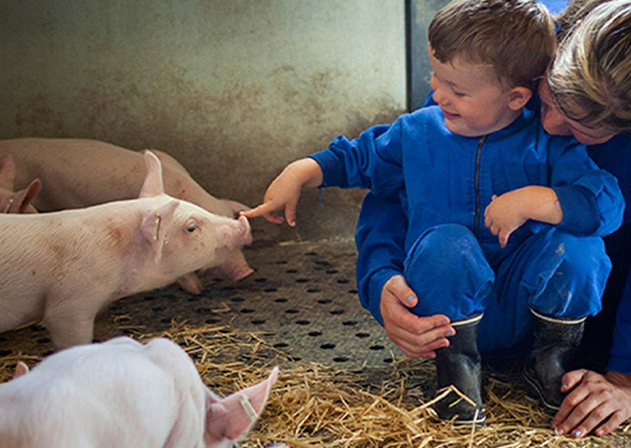Uniform growth and reduced need for antibiotics
By choosing high quality feed ingredients with a minimal content of anti-nutritional factors, producers can ensure optimum nutrient digestibility and minimal damage to the gut environment. Numerous studies have already shown the benefits to young animal health, development and growth.
While there will always be a need to treat some causes of diarrhoea, the use of antibiotics can be minimised through the use of best available technology – in this case, by using the best known raw materials.

Uniform growth
Hamlet Protein ensures better gut health and growth among the smallest piglets. This leads to higher uniformity as they grow older meaning less work for the farmer as the herd reaches their end weight at the same time.
Young animals gain weight faster when their feed contains HAMLET PROTEIN ingredients. This can be explained by the high digestibility of our proteins.
By gently removing the anti-nutritional factors that limit the digestibility of native soy protein, we ensure the bioavailability of the amino acids that are the building blocks for growth.
Feeding trials have found that our specialty soy proteins improve the feed conversion rate and average daily weight gain of young animals.

Reduced need for antibiotics
Studies show that many instances of diarrhoea in young animals are caused by nutritional shortcomings.
This could be prevented by better selection and composition of the ingredients in the diet – with no use of antibiotics at all.
Faced with consumer and regulatory pressure, EU producers are now aiming to claim ‘no antibiotics ever’. Outside the EU, various definitions of antibiotic-free (ABF) production are in circulation.
Reduced use, ionophores only, organic production with no antibiotics, ionophore coccidiostats, chemical anticoccidials or chemical antibacterials, such as sulphonamides, are among the approaches employed. ‘No antibiotics ever’ refers to animals raised without antibiotics in their feed and water and injections that include no ionophores, although they may still receive coccidiostats.



